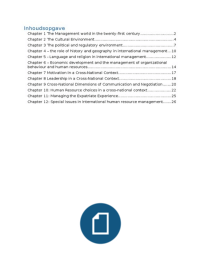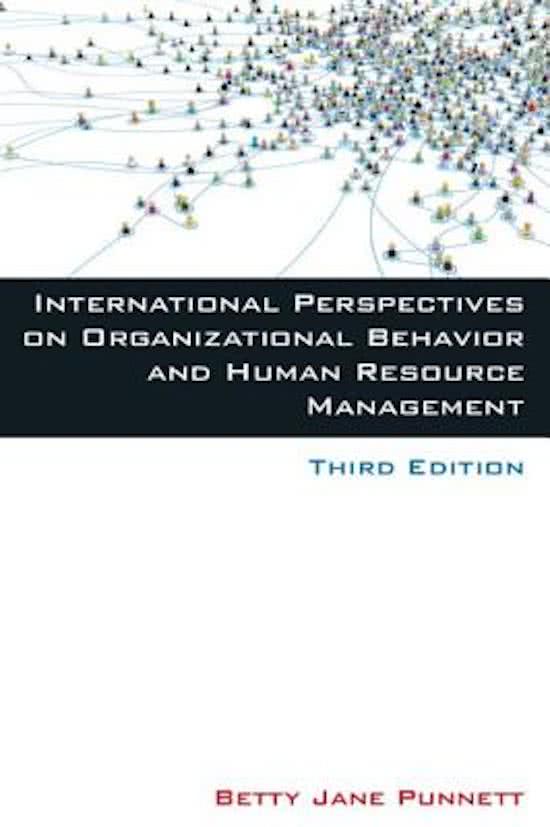Inhoudsopgave
Chapter 1 The Management world in the twenty-first century............................2
Chapter 2 The Cultural Environment...................................................................4
Chapter 3 The political and regulatory environment...........................................7
Chapter 4 – the role of history and geography in international management...10
Chapter 5 - Language and religion in international management.....................12
Chapter 6 – Economic development and the management of organizational
behaviour and human resources.......................................................................14
Chapter 7 Motivation in a Cross-National Context.............................................17
Chapter 8 Leadership in a Cross-National Context............................................18
Chapter 9 Cross-National Dimensions of Communication and Negotiation.......20
Chapter 10: Human Resource choices in a cross-national context....................22
Chapter 11: Managing the Expatriate Experience.............................................25
Chapter 12: Special issues in international human resource management.......26
,Chapter 1 The Management world in the twenty-first century
It is an important thing to know that the majority of research on organizational
behavior and human resource management has focused on North America,
Europe and Japan. Because of their a big players in the world’s trade and
investment. So there is relatively little research to draw on when other parts of
the world are discussed.
The meaning of globalization for managers
Globalization refers to growth of trade and investment, accompanied by the
growth in international businesses and the integration of economies around the
world. The globalization concept is based on a number of simple premises, which
continue to hold true and accelerate. (examples p.7)
- Increased communication and travel lead to a seemingly smaller world
- A smaller world makes people more aware of events outside of their home
country and more like to travel to other countries
- This results in a better understanding of foreign opportunities
Successful businesses will exploit opportunities wherever they are and will be
ready for the threats from wherever they come. This is also called ‘global
philosophy’, seeing the world as the place to do business. Successful managers
need to understand the similarities and differences across national boundaries in
order to exploit the opportunities and deal with the threats.
Understanding attitudes to globalization
During the 1980-1990s there were significant efforts to promote global free trade
and investment, with the general belief that freer trade and investment would be
good for the world economy. They thought that developing countries and the
developed countries would benefit from globalization.
The World Bank saw globalization as an essential part of the economic, political,
and social development throughout the world.
During the early 1990s they thought that globalization was working. There was a
rapid economic growth of Asian countries, as well as the industrializing countries
such as Brazil and Mexico.
And during the 1990s, the USA experienced one of its most sustained periods of
growth.
There was much talk of a “new economy” based on globalization, which was
immune to economic shocks and recession.
Unfortunately, this new world was not reality. In the late 1990s, the “Asian tigers”
suffered major economic setbacks. And in 2002 Argentina’s economy crashed.
Further problems occurred in the economies of Japan, EU and the USA. The
developed countries have experienced slow or no growth. In 2012 several
countries in the EU experienced serious economic problems. These problems
have led to significant cutback in government spending in the affected countries.
Many people are rethinking the benefits of the European Union and the euro.
It is a fact that periods of faster growth are followed by periods of slower growth.
The benefits of globalization are not necessarily shared equally, however, and
some partners will likely befit more than others. Those who benefits most will like
globalization, those who benefit least will not.
the richest 20% of the world have 86% of the world’s gross domestic product
(GDP), the middle 60% have 13%, and the poorest 20% only 1%.
,The People’s Republic of China (PRC) has become the supplier of inexpensive
manufactured products for most of the world. The PRC lacks some needed
resources, and has been investing in countries in Africa and Latin America where
the resources are available. This pushed the economic growth in the PRC and the
countries they invests.
It is important for managers that they understand the arguments for and against
globalization rather than seeking to prove or disprove them. Making appropriate
human resource choices and paying attention to behavioral issues will be critical
to success in this environment.
The future of globalization
Chinese-owned businesses are investing around the world, Dubai is establishing
itself as a global finance center, and companies small and large from developing
countries around the world are now investing in the developed world. The cross-
border takeover share of China was about 6,2 percent.
Management interactions between developing and developed countries implicitly
assumes that manager from developed countries will be adapting to the
environment in developing countries.
The economic slowdown in developed countries has had a negative impact on
trade and investment. There is also less consumption and production, which
affects domestic and international trade. The 9/11 attack also had an impact that
slowed trade and investment, resulting in less international travel for
businesspeople and tourists, higher costs for services such as insurance and
security.
In Africa 90% of the stock of Foreign Direct Investment (FDI) originated from
developed countries, however there is a substantial growing portion of
investments from China an India.
The BRICS was originally coined to encapsulate the fast growing economies of
Brazil, Russia, India and China. Later joined South Africa the group.
Today Managers in international companies clearly have to be alert at all times to
what is happening in their environment. It is important that the right people are
in the right place, and that behavioral interactions are managed well.
Cross-national Convergence and Divergence = naar elkaar toegaan / van
elkaar afgaan
Globalization, and the forces that lead to global integration, also lead to a certain
degree of convergence in behaviors around the world. More travel and easier
communication certainly means that people everywhere are much more aware of
what is happening in other parts of the world.
The growth in firms operating cross-nationally also contributes to the
convergence of attitudes, values and behaviors. Some companies make efforts to
standardize policies throughout the nations in which they operate. They try to
create a corporate culture that is common to all their locations.
Ease of communication and travel can possibly have a divergent effect. Extensive
exposure to foreigners and foreign media may increase awareness of the home
values, which may be seen as particularly “good” in contrast to foreign values. A
sense of domination by foreigners can result in a determination to maintain one’s
own value system.
,Managers in international firms must always expect and be ready to deal with
differences, and it is especially critical for them if they are the foreigners or work
with others from different cultural backgrounds.
The Internet may be a force for convergence and divergence, because it provides
an opportunity for people around the world to communicate easily. This means
that people can easily learn about each other. At the same time, it can be argued
that the Internet allows small numbers of people who share a particular view to
communicate with each other and develop divergent value systems.
The World Beyond 2010
Nothing very interesting or important I think.
,Chapter 2 The Cultural Environment
The forces for cultural convergence suggest that countries are becoming more
alike in some ways, one of which is democracy.
National culture originates from societal variables such as language, religion
and history. As well as national variables such as government, laws and
regulations, geography. National cultures plays a fundamental role in forming
cultural values.
Cultural values interact with needs, attitudes, norms of individuals and groups.
Culture – definition on page 22.
- Culture is learned, people are socialized from childhood to learn the rules and
norms of culture. It is possible to learn a new one
- Culture is shared, the focus is on this that are shared by members of a group
rather than on individual level. It is possible to study group patterns
- Culture is compelling, specific behavior is determined by culture without
individuals being aware of the influence of their culture. First, understand
culture > understand behavior
- Culture is an interrelated set, various facets of culture can be examined in
isolation. This should be understood in a whole.
- Culture provides orientation to people, members of a group generally react
the same way to a given stimulus. Culture can help to understand members
reactions.
Culture is so fundamental in society because it influences people’s behaviors in
critical ways. Managers need to understand the culture.
Cultural Values
Values are useful in explaining and understanding cultural similarities and
differences in behavior.
It is important for a manager to know how to interact effectively with others
whose values and behaviors are unfamiliar.
Values are enduring beliefs that specific modes of conduct or end states of
existence are socially preferable to their opposites. Values and norms are
societal, while needs and attitudes are individual
Needs are forces to motivate an individual to act in a certain way. Once satisfied,
needs no longer have an impact on behavior. A need for food motivates people to
seek, if they have eaten, they won’t seek anymore.
Attitudes are describes as a tendency to respond favorably or unfavorably to
object or situations based on beliefs about them. Societal values influence what
we respond favorably to and what we view with disfavor.
Norms are specific behaviors in specific situations and result in standardized,
distinctive ways of behaving. These behaviors are seen as normal and
appropriate. Norms probably originated from values, but they no longer clearly
represent these.
, Cultural Value Models
1. Kluckhohn and Strodtbeck’s Value Orientation Model
To explain cultural similarities and differences in terms of basic problems that all
human societies face. And different societies adopt different solutions. This can
be used in countries where are people like this. There are six problem areas:
- Relationship to nature: subjugation, harmony and mastery
- Time orientation: past, present and future
- Basic human nature: evil or good, changeable
- Activity orientation: being, doing, containing and controlling
- Human relationships: individualistic, lineal, co-lineal
- Space: private, public
See example at page 28
2. Hofstede’s Value Survey Model
Used to provide country information of relevance from a managerial point of view.
The cultural values that are typical of a particular society can influence what is
effective in terms of the management process. See example at pages 32, 33.
- Individualism: individualism is high, the society emphasizes the role of the
individual
- Uncertainty avoidance: High, the people are concerned with certainty and
security, and they will try to reduce uncertainty
- Power distance: high, the people are believing that there should be a well-
defined hierarchy in which every citizen has a rightful place.
- Masculinity: low score indicates that sex roles are more fluid and feminine
values predominating
- Confucian Dynamism: Long-term orientation. Short time horizon is more
concerned with events in the present and immediate future.
Limitations of the model
The most important limitation is that researchers have expressed concerns
regarding the survey instrument and the validity of the measure.
Some types of people are attracted to the same kind of organizations, so you get
same results in other countries. The array of values in any given country will
probably be larger.
Use VSM in management
The cultural values that are typical of a particular society can influence what is
effective in terms of management process. Look at the model and know what it
mean for a country.
3. Country clusters
Examining clusters of countries that share similar values can be a useful
approach for international managers. Countries in the same cluster have almost
similar values and there is easy adaption possible. Moving outside the cluster can
be more difficult because the diversity of values and greater need of adaption.
See example at page 36
Limitations of country cluster info
Regions such as Africa and Eastern Europe are not represented and within
clusters, major countries are missing. It is based on variables in the past. They
don’t identify the similarities.






